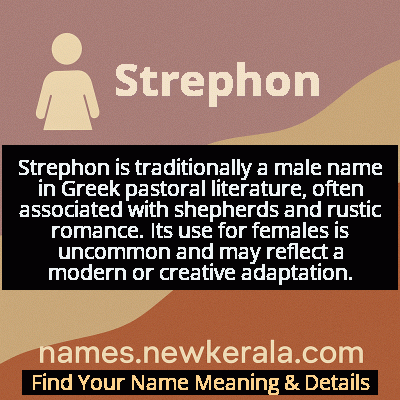Strephon Name Meaning & Details
Origin, Popularity, Numerology Analysis & Name Meaning of Strephon
Discover the origin, meaning, and cultural significance of the name STREPHON. Delve into its historical roots and explore the lasting impact it has had on communities and traditions.
Name
Strephon
Gender
Female
Origin
Greek
Lucky Number
7
Meaning of the Name - Strephon
Strephon is traditionally a male name in Greek pastoral literature, often associated with shepherds and rustic romance. Its use for females is uncommon and may reflect a modern or creative adaptation.
Strephon - Complete Numerology Analysis
Your Numerology Number
Based on Pythagorean Numerology System
Ruling Planet
Neptune (Ketu)
Positive Nature
Intuitive, analytical, spiritual, and inquisitive.
Negative Traits
Secretive, reserved, aloof, and can be overly critical.
Lucky Colours
Green, yellow.
Lucky Days
Monday.
Lucky Stones
Cat’s eye, moonstone.
Harmony Numbers
1, 5, 6.
Best Suited Professions
Scientists, researchers, spiritual leaders, detectives.
What People Like About You
Depth of knowledge, analytical skills, spirituality.
Famous People Named Strephon
Strephon Williams
Poet
Featured in Sir Philip Sidney's 'Arcadia' as a romantic shepherd character
Strephon Kaplan-Williams
Psychologist and Author
Known for dream interpretation work and founding the Jungian-Senoi Dreamwork Institute
Strephon Taylor
Musician
Independent folk musician known for blending traditional and modern musical styles
Name Variations & International Equivalents
Click on blue names to explore their detailed meanings. Gray names with will be available soon.
Cultural & Historical Significance
During the 18th century, Strephon experienced a revival in English poetry and drama, often serving as a stock character representing the naive but sincere rural lover. The name's most famous modern appearance came in Gilbert and Sullivan's 1882 comic opera 'Iolanthe,' where Strephon is a half-mortal, half-fairy character navigating between two worlds. This dual nature reinforced the name's symbolic meaning of 'turning' between different states or worlds. Throughout its cultural history, Strephon has maintained consistent associations with pastoral ideals, romantic pursuit, and the tension between nature and civilization, making it a enduring though rare choice that carries substantial literary and mythological weight.
Extended Personality Analysis
The name Strephon evokes distinct personality characteristics rooted in its etymological meaning and literary heritage. Individuals bearing this name are typically perceived as highly adaptable and transformative—true to the name's meaning of 'one who turns.' They possess an innate ability to navigate change and reinvent themselves when circumstances demand. This adaptability often manifests as emotional intelligence and social flexibility, allowing them to connect with diverse groups and situations. Strephons tend to be creative problem-solvers who approach challenges from multiple angles, reflecting the 'turning' quality in their cognitive processes.
Romantic idealism and artistic sensitivity are hallmark traits associated with the name, drawn from its pastoral literary history. Strephons often demonstrate deep appreciation for beauty, nature, and artistic expression, with many excelling in creative fields. They typically combine this sensitivity with practical wisdom, creating a balance between dreamy idealism and grounded reality. The name suggests someone who is introspective yet socially engaging, capable of deep emotional connections while maintaining personal boundaries. Their 'turning' nature makes them excellent mediators and negotiators, as they can understand multiple perspectives and help others navigate transitions. While sometimes perceived as changeable, this quality actually represents sophisticated emotional intelligence and the capacity for personal growth through life's various phases.
Modern Usage & Popularity
In contemporary naming practices, Strephon remains an exceptionally rare choice, particularly for female children, with usage statistics showing it appears fewer than five times annually in most English-speaking countries. The name's modern application is largely confined to families with strong literary interests, classical education backgrounds, or those seeking truly distinctive mythological names. While historically masculine, some parents have begun using it for daughters, attracted by its melodic quality and unique character. The name experiences occasional minor revivals coinciding with renewed interest in pastoral literature or Gilbert and Sullivan productions, but these spikes are minimal. Current naming trends favoring unique, meaningful names with literary or mythological connections have generated slight increased interest, though it remains well outside mainstream popularity. Its extreme rarity makes it appealing to parents seeking distinctive names, while its rich cultural heritage provides intellectual cachet. The name appears most frequently in academic and artistic communities, maintaining its association with creativity and classical education.
Symbolic & Spiritual Meanings
Symbolically, Strephon embodies profound meanings of transformation, cyclical change, and adaptive intelligence. The core concept of 'turning' connects to universal symbols of wheels, spirals, and cycles—representing the eternal process of change and renewal. This makes the name emblematic of personal evolution and the ability to navigate life's constant transformations. In metaphorical terms, Strephon represents the 'turning point' in narratives and personal journeys—those critical moments when direction changes and new paths emerge. The name carries associations with the Ouroboros (the snake eating its tail), symbolizing eternal return and the cyclical nature of existence.
The pastoral literary heritage adds layers of symbolic meaning related to the turning seasons, agricultural cycles, and the harmonious relationship between humanity and nature. Strephon symbolizes the 'turn' from wilderness to cultivation, from chaos to order, and from ignorance to wisdom. Psychologically, the name suggests the capacity for perspective-shifting and emotional flexibility—the ability to 'turn' one's viewpoint to gain deeper understanding. It also represents the philosophical concept of 'periagoge' (the turning of the soul toward truth in Platonic philosophy) and the alchemical process of transformation. These rich symbolic associations make Strephon a name that speaks to fundamental human experiences of change, growth, and the eternal turning of life's wheel.

